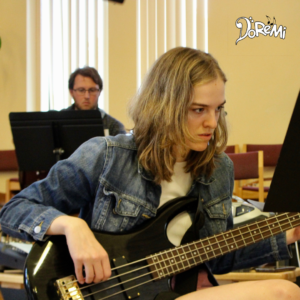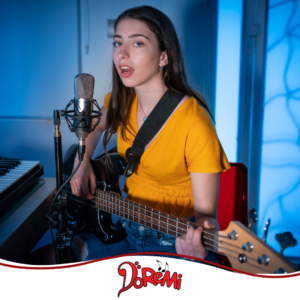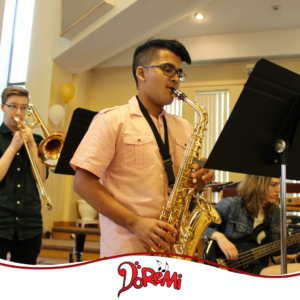Young people today are completely immersed in music. As with previous generations, music is a resource from which they explore possible selves, rehearse social roles, manage group dynamics and envision possible futures.
Music has the power to speak to us on a very deep and primal level. The power of music to evoke strong emotions, imagery and ideas has been recognized for centuries and has been studied at length. Music affects us all in very personal and unique ways, and teens, due to their quickly shifting emotions, are especially receptive to its power. The benefits of music for our youth are magnified if they have the opportunity to learn to play an instrument and to perform.
Music and the Brain
Advancements in brain research are revealing many interesting ways in which active music making can help to strengthen neural connections. Learning to play an instrument can lead to higher cognitive flexibility, more proficient working memory, and faster processing speed. It has also been shown to enhance executive functions as well as reading and verbal skills. Music lessons, even for teens, can provide amazing benefits for intellectual abilities, creativity, and academic achievement.
Music and Emotion
 One of the hardest things to go through as a teenager is oscillating emotions, and how to cope with them. Being able to use music not only as an escape, but also as a means to work through problems, peer pressure, academic expectations, social dynamics and perhaps even more difficult issues, can help a young mind grow and thrive.
One of the hardest things to go through as a teenager is oscillating emotions, and how to cope with them. Being able to use music not only as an escape, but also as a means to work through problems, peer pressure, academic expectations, social dynamics and perhaps even more difficult issues, can help a young mind grow and thrive.
Teens often use music to relieve tension and to express their innermost feelings and thoughts in a nonverbal way. Many teens use music to purge negative emotions such as frustration, aggression or anger, or even to handle feelings like loneliness.
Research into what happens in the brain when making music has shown that it activates neurotransmitters involved in pleasure, providing not only mood enhancement but a tool against depression. As well, it modulates hormones involved in stress. Active music making can not only serve to help regulate those emotional oscillations, but also to help manage stress.
Music and Coordination
 Playing music lights up your brain like a Christmas tree. The mind is working on processing visual, physical and auditory cues at the same time. Active music making requires the simultaneous use of both sides of your brain. Fine motor skills are controlled using both hemispheres. As well, when playing music, the novel and creative (which is the right side) is combined with the linguistic and mathematical (which is the left side).
Playing music lights up your brain like a Christmas tree. The mind is working on processing visual, physical and auditory cues at the same time. Active music making requires the simultaneous use of both sides of your brain. Fine motor skills are controlled using both hemispheres. As well, when playing music, the novel and creative (which is the right side) is combined with the linguistic and mathematical (which is the left side).
Playing an instrument that requires the use of both your hands and your feet not only helps develop the left-right crossover, but also helps develop upper-lower coordination skills.
Learning to play an instrument also helps develop hand-eye coordination. The ability to see a note and play it at the same time, is a skill that can extend into other areas of life.
Music and Identity
 Teens who learn to play acoustic instruments gain self-esteem. When teens have a way to channel their thoughts, moods, feelings and ideas into a creative outlet, they have an easier time expressing themselves. Playing a musical instrument, or even creating electronic music, offers teens a way to learn how to just be themselves.
Teens who learn to play acoustic instruments gain self-esteem. When teens have a way to channel their thoughts, moods, feelings and ideas into a creative outlet, they have an easier time expressing themselves. Playing a musical instrument, or even creating electronic music, offers teens a way to learn how to just be themselves.
Active music making leads to self discipline and organizational skills. Learning how to play an instrument is really a task that a student has to take on for himself or herself. Organizing responsibilities in order to be able to dedicate time to learn how to hit the right notes and play a song takes discipline and commitment. When youth learn this ability to go after what they want, it carries over into other aspects of their lives, becoming part of who they are.
Many teens believe that opportunities for engagement as performers, composers, and intelligent listeners are deeply meaningful experiences. They use these opportunities as a means to express who they are.
Music and Socialization
 Being a musician becomes not only part of a teen’s personal identity, but part of their social identity as well. Music is a badge that helps shape peer groups and cultural identification. Teens often use music preferences and abilities to manage social impressions, evaluate similarities and set up social groups.
Being a musician becomes not only part of a teen’s personal identity, but part of their social identity as well. Music is a badge that helps shape peer groups and cultural identification. Teens often use music preferences and abilities to manage social impressions, evaluate similarities and set up social groups.
Playing music, whether as part of a school band, social band, or in music lessons can have a positive effect in the social lives of youth. Having a skill that they are confident in helps youth to learn how to relate to their peers and use their common hobbies to create a bond. Teenagers use musical experiences to form friendships and to set themselves apart from parents and younger kids. They see music not only as a “social glue”, but also as a bridge for building acceptance and tolerance for people of different ages and cultural backgrounds.
It’s never too late to start
With so many positive reasons to learn to play music, it’s definitely a skill that should be fed and nurtured. The benefit of playing music will not only factor into a teen’s life now, but will stick with them long into their future. Our teachers have a great rapport with the young people who come to the school to learn to play. Check out our featured video for a song composed by one of our students. Contact us for information on schedule and instrument options.

